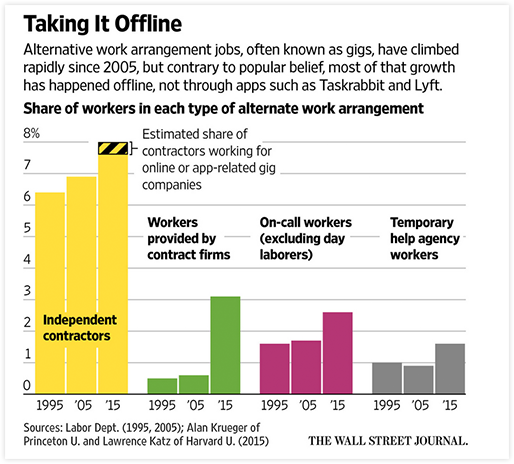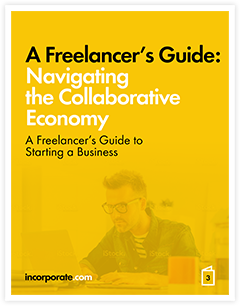The Freedom of Freelancing
Whether you're a seasoned freelancer and are curious about incorporating, or you're just beginning to transition to the freelance world, we've got some great advice to help you succeed as a solopreneuer.
Although the Bureau of Labor Statistics woefully neglects the new class of freelancers, part-timers, and gig employees, it's no secret they are poised to dominate the workforce in the coming years. As The Wall Street Journal reported in May of 2016, research from Alan Krueger of Princeton University and Lawrence Katz of Harvard University shows the number of employees in the contract workforce has climbed to 16 percent, up from 10 percent in 2005. For someone like Faye Rivkin, a technical writer, starting a freelance business was the best option.
Faye Rivkin's educational background in chemistry and work experience in human resources may not seem like the typical route for a writing career. But she not only made it happen, she's also been doing it successfully for more than a decade. Her love for writing was something she stumbled upon in one of her HR roles.
"I wrote a manual for a call center. And when I did it, I realized that I really enjoyed that more than anything out of all my different jobs," says Faye.
After moving to San Diego, Faye was at a crossroad: learn the divergent HR laws for California, or find a writing job. "I decided I really didn't want to go through the process of looking for a job again because I had been laid off three times in five years. So I started my freelance business," she explains.
Faye's story embodies the ideal of finding what you're passionate about and making it your work. As a technical writer, she's created a niche for herself in Baltimore. But her journey was not without a little trial and error. Read on to pick up some tips, tricks, and advice from Faye.

1. Get Real About Your Lifestyle and Budget
If you're looking to start freelancing full-time, one of the biggest things you'll have to consider is finances. You won't consistently be earning a paycheck every two weeks. In fact, you might not earn a paycheck every two months. Your income will vary and depend heavily on the kinds of clients you work with and the rate that you set with them.
"Don't do what I did," Faye warns. "I had savings but I didn't have a plan. My recommendation would be to have a budget."
"Going into this, know what your expenses are every month. There are going to be expenses that you are not going to know every month," Faye explains. "But there are expenses - your phone, your rent or mortgage, your cable, your electric. These are expenses you're going to know. So figure out what you need to live on."
Some months will be slow to start, but if you're keenly aware of your fixed expenses, and you do a good job of setting aside money for the slow times, then you'll be able to survive when work is slow.
2. Make It Official
Maybe you're wondering if it's even necessary for a freelancer to incorporate. And that's a valid question. But in the end, it's always better to protect yourself and your assets, no matter how small your freelance income is.
For Faye, it not only gave her peace of mind, but it made it easier for her to do business.
"Several of my clients prefer to work with registered businesses. They have to give a certain percentage of their work to minority-owned business, and with my LLC, I'm able to self-certify as a woman-owned business," Faye explains.
"So having the LLC has been helpful in the eyes of some of my larger clients and those who are growing. It gives them a level of security." she continues. "They're not paying Faye Rivkin. They're paying Write Faye Write LLC. And there's a business license, an LLC, and a legal agreement behind that."
Faye explains that some of her smaller clients aren't as concerned with the LLC status. But bigger clients, particularly growing businesses, are. And they're more likely to be able to offer you continuous work. So attracting those kinds of clients with an LLC might be the best thing for your freelance business.
3. Keep Clients Coming Back
As a freelancer, you'll also have to be your own business development manager. Getting client work, and continuing to get client work, will fill up a good chunk of your time at first. But, if you do your job well, you'll develop a relationship with those clients where they'll turn to you every time they need something.
"I think one of the biggest problems initially was just getting my name out there and keeping it out there," says Faye. "But in the past 10 years, I've developed this niche where if someone has a complex, technology-focused, topic that they need to write about, they know to call me."
If you're just starting out, you will need to hustle and possibly even step outside of your comfort zone in regards to the kinds of work that you take. But, as Faye learned, you'll find your preferences and then be able to develop a client base accordingly.
"They joke was, I would write for anyone who would pay me to write for them," Faye says with a laugh. "I wrote about product. I wrote about services. I did business to consumer writing. I did B2B writing. But I really quickly learned that I preferred B2B."
Once you find your niche, the trick to keeping clients coming back to you is simple.
"Do your job. Do it well. Do it when they want it, and do what they want," Faye says.
Sounds simple enough. But it does take an undeniable amount of hustle. So if you think you'd like to be your own boss and choose the kinds of client work that you do, mentally prepare for a lot of work–work that will pay off tenfold once you're up and running.
Additional Resources
Quickbooks Self-Employed provides resources to estimate quarterly taxes, track expenses, maximize deductions, and more.
Freelancers Union was launched 20 years ago with the radical idea of making freelance fair. They work help freelancers secure health insurances and make sure that they're getting paid on time for their work, among other things.
Upwork offers something for every type of freelancer with short- and long-term projects, hourly or per-project work and expert- and entry-level engagements.
Hourly Nerd connects freelancers to 17,000 of the world's smartest business experts in one easy place.
Work Market is fundamentally transforming how businesses and freelancers work in a modern world.
Bench–Small Business Syllabus offers accounting, bookkeeping, and tax tips to help your business succeed.
Ready to take the leap? Get more tips on how to go from mom to mompreneur with these free incorporate.com guidebooks:
Click to download


No Dumb Questions
Get your freelance biz questions answered and learn the ins and outs of entrepreneurship by calling 877.870.4312 or send us a message.
Ready to take the leap?
Get more tips on how to succeed as a solopreneur:
A Freelancer's Guide: Navigating the Collaborative Economy How to Form A Corporation or LLC